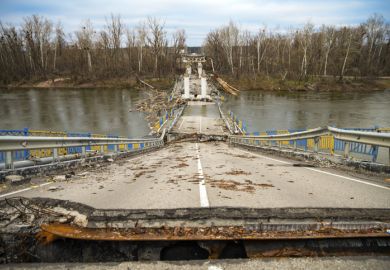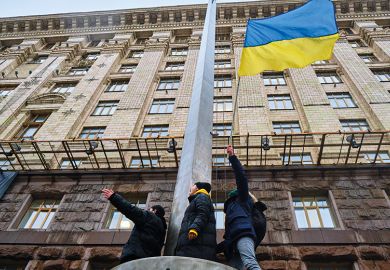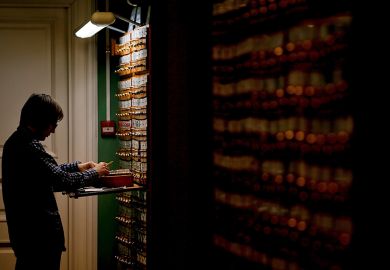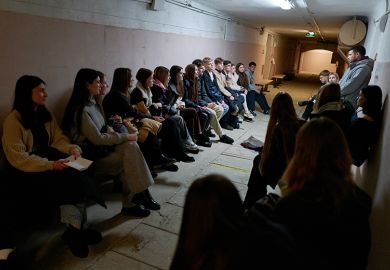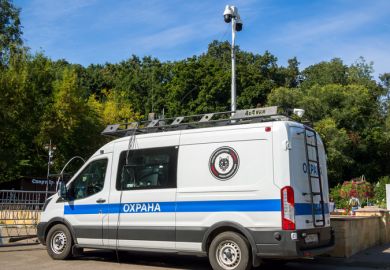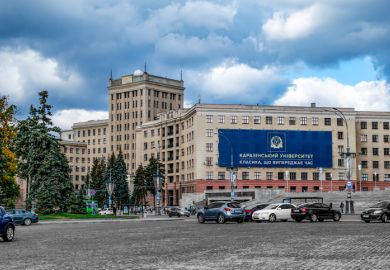At Kyiv School of Economics, the wail of air-raid sirens across the Ukrainian capital doesn’t signal the end of class. Instead, students and professors head underground to the basement, converted in the summer of 2022 into bomb shelters that double as classrooms. “We have the same equipment as we have above in our ordinary classroom: laptops, projectors, screens, tables, wi-fi,” says Yegor Stadnyi, vice-rector of the small private university and former deputy minister of education and science. “Everything is exactly the same, but no windows.”
Kyiv School of Economics (KSE) resumed classes online less than three weeks after Russia’s full-scale invasion of Ukraine in February 2022, with students beginning to return to campus the following September. In 2023, the university launched five new bachelor’s programmes and three new master’s programmes, while student numbers more than tripled. Russia has repeatedly bombarded Kyiv with drones and missiles, killing residents and setting buildings ablaze, but KSE has adapted. “This is already our ordinary mode of life,” Stadnyi says.
For other universities, however, adaptation is impossible. According to the Ukrainian government, 57 of the country’s 800 or so higher education institutions had been damaged by November 2023, while six were completely destroyed. The brutal three-month siege of the south-eastern city of Mariupol laid waste to the Mariupol State University campus; in Kharkiv, just 30km from the Russian border, shelling reduced much of the Karazin Kharkiv National University to ruins.
Last month, Ukraine marked a solemn anniversary: two years of a war that, according to the country's president, Volodymyr Zelensky, has already led to the deaths of more than 30,000 Ukrainian soldiers and tens of thousands of civilians; other estimates put those numbers higher. In addition, according to the United Nations, 6.3 million refugees have fled Ukraine and 3.7 million have been displaced within its borders – and with no end to the war in sight, all of those numbers seem certain to keep rising for the foreseeable future.
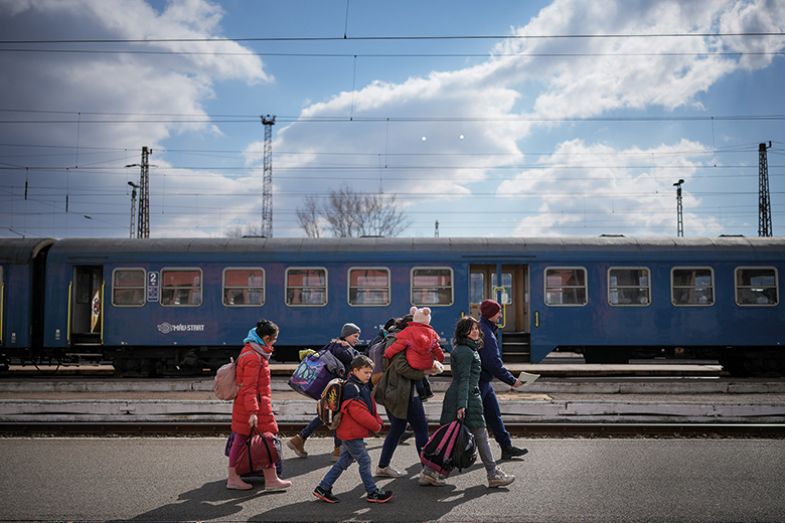
Yet, even so, talk in Ukraine is increasingly turning to reform and reconstruction of the country’s sprawling and underperforming higher education system. It is a big ask with no end to the fighting in sight, but observers are all agreed that the task is an urgent one, which cannot easily wait until that end does finally arrive.
Even before the war, the Ukrainian higher education landscape was fractured. Among the challenges it faced, says Martin Kahanec, professor in public policy at Vienna’s Central European University, were “outdated infrastructure, brain drain due to low salaries and limited career prospects, bureaucratic hurdles, and a lack of international collaboration and recognition”. The difficulties were “exacerbated”, Kahanec adds, “by a lack of modern management and limited strategic vision”.
Although the 2014 Higher Education Act sought to introduce greater institutional autonomy, public institutions still lack the freedom to control their own budgets, says KSE’s Stadnyi, while the country has “too many institutions [and] too little funding for such a vast network”. Moreover, population decline means that the country’s 800 universities were serving a dwindling student body even before the war decreased the student pool further; students are exempt from the military draft, but they can voluntarily enlist.
Research and development expenditures are low, says Alexander Kostyuk, editor-in-chief of the corporate governance publishing house Virtus Interpress, accounting for just 0.29 per cent of Ukraine’s GDP in 2021. According to the Unesco data, Ukraine had only 587 researchers per million people that year, down from 1,037 five years earlier and the lowest figure in Europe except for Bosnia and Monaco. Both the UK and US had about 4,500, and South Korea more than 9,000.
Then there is the corruption. A 2015 USAID report found that Ukrainian universities were “rife” with it, and that perception is endorsed by Ararat Osipian, an economist who specialises in academic corruption. “There was outright bribery and fake degrees; you could purchase your master’s thesis or your PhD dissertation,” explains Osipian, who is a fellow of the New Europe College Institute for Advanced Study in Bucharest but, under martial law, is unable to leave Ukraine and, having been displaced from the eastern city of Kramatorsk, now lives in a temporary shelter further west – “a refugee in my own country”.
But academic corruption is no surprise in a country that ranked 104th out of 180 countries in Transparency International’s 2023 Corruption Perceptions Index, which ranks countries on their transparency. “If everything around is corrupt, then higher education is also corrupt. It’s not an oasis,” Osipian says.
In 2021, the World Bank announced a $200 million investment to “support the Government of Ukraine’s efforts to strengthen efficiency, quality and transparency of the country’s higher education system”. The project will run until the end of 2026, but, Osipian points out, almost $100 million was redirected from the budget to cover academic and social scholarships for students after the outbreak of war. With half its funding gone, he is doubtful that the project will succeed.
Even more than the destruction of university buildings, experts are concerned by the loss of human capital from Ukraine. Academics are also exempt from the military draft, provided that they have at least a 0.75 contract, according to Osipian – which means that, in Kostyuk's estimation, only between 3 and 5 per cent of all male academics have been conscripted: somewhere between 1,500 and 2,000 individuals, in an army of 1 million. However, more than 18 per cent of Ukraine’s scientists have left the country since the Russian invasion, according to a study by researchers at Switzerland’s École Polytechnique Fédérale de Lausanne published in December in Humanities and Social Sciences Communication, with the most productive scientists the most likely to have left. Of those who remained in Ukraine, the study found, more than a fifth were unable to physically access their institution, while almost a quarter could not access “critical input” for their research.
The economists Ina Ganguli and Fabian Waldinger, of the University of Massachusetts Amherst and LMU Munich respectively, find in a forthcoming study that more than 5 per cent of Ukraine’s elite scientists have emigrated, while research papers published by Ukrainian academics fell by a 10th in the first year of the war.
“I’m much less worried about the loss of physical capital, because we can just throw money at it,” Waldinger tells Times Higher Education. “All of my research points in the direction that the people are what make universities.”
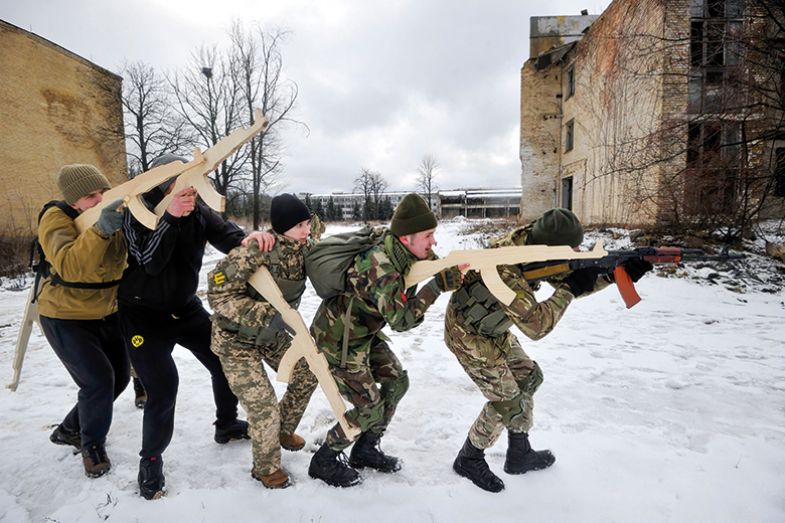
Schemes such as the Researchers at Risk Fellowships, established by the British Academy and the Council for At-Risk Academics (Cara), helped many scientists and their families find shelter outside of Ukraine while continuing their research at international universities. But as the war drags on, some academics will inevitably build lives in their new countries, establishing new laboratories and research collaborations.
“The longer the war lasts, the more problematic this kind of emigration that will maybe not be reversible will become,” says Waldinger. “Emigration of scientists is really the key threat to universities in the long run.”
The impact is likely to be multigenerational, as younger scholars will lose out on the mentorship. “So the new generation will have worse training, and some will maybe leave the science sector completely,” Waldinger says. “These effects are very hard to reverse because you’re potentially missing entire generations of scientists.”
Then there are the terminated collaborations with Russian scientists, who were previously among Ukrainian researchers’ most frequent collaborators because of their proximity and, in many instances, shared language. According to Ganguli and Waldinger’s study, Ukrainian papers co-authored with scientists in Russia dropped by more than 40 per cent in the first year of the war. And Waldinger warns that replacing those collaborators will not be straightforward because collaborations have to “grow endogenously from the science community”.
At the British Council’s Going Global conference last December, Ukraine’s deputy minister of education and science, Mychailo Wynnyckyj, said that some European institutions were “recruiting [Ukraine’s] academics under the guise of providing help” but were actually doing more harm than good because doing so amounted to the “soft encouragement of brain drain”.
To attract researchers back, Waldinger suggests that Ukraine could offer generous grants with conditions attached: successful applicants could, for instance, be required to give up affiliations with institutions outside the country.
“There will be lots of people who want to rebuild Ukraine,” he adds. “That can be a mission for some people, and I think you have to appeal to that to bring people back.”
Nadiya Ivanenko is one of those people. A linguist and a Cara-funded visiting research fellow at the University of Oxford’s department of education, Ivanenko was vice-dean of foreign languages at Central Ukrainian State University, Kropyvnytskyi, when Russia invaded. She fled the country with her teenage daughter, who, she hopes, will be able to finish her GCSEs in the UK.
As her daughter studies, Ivanenko is also very busy publishing papers, attending conferences and contributing to monographs. “But I’m quite happy about that,” she says. “It leaves me less time for unpleasant and sad thoughts about my family back in Ukraine.” Still, she is determined to return post-GCSE to “apply the knowledge and experience I’ve gained to contribute to the [Ukrainian] university community”.
Meanwhile, Olha Myshakivska, a psychiatrist and visiting researcher at King’s College London, is collaborating with colleagues at Taras Shevchenko National University of Kyiv to collect data for her work on alcohol consumption among Ukrainians in wartime. It’s “an opportunity to be linked with both universities and not lose the connection with my country”, she says. “I’m trying to use this opportunity as much as I can to bring this experience back to Ukraine.”
For Myshakivska, even those who don’t return should reflect on how they can support Ukrainian academia. “Think how you can contribute to your home university, to your home country,” she advises. “What knowledge can you share? What joint projects can you arrange?”
Myshakivska and her children also spend all their holidays in Kyiv, where her husband still lives. Hence, she is familiar with the “horrible psychological pressure” that the city’s residents live under. “During the night-time, [the Russians] send the drones and then the missiles,” she explains, adding that during their last visit to Kyiv over Christmas, “almost every other night was sleepless for me. A few nights I was hiding; I took my children from their beds to some safer place. It’s the usual environment for people in Ukraine. They have sleepless nights, and then the next day they need to function.”
Living in such conditions has obvious consequences for mental health, and experts warn that the psychological impacts of the war could impact Ukrainian higher education for years to come. Researchers from Berdyansk State Pedagogical University surveyed more than 800 Ukrainian academic staff between July 2022 and January 2023 for a paper published in Scientific Reports. They observed increases in characteristics of burnout, including emotional exhaustion, depersonalisation and diminished feelings of accomplishment. Such feelings are “particularly damaging in the academic context, where passion and commitment to one’s field and students are paramount”, says lead author Natalia Tsybuliak, an associate professor in psychology.
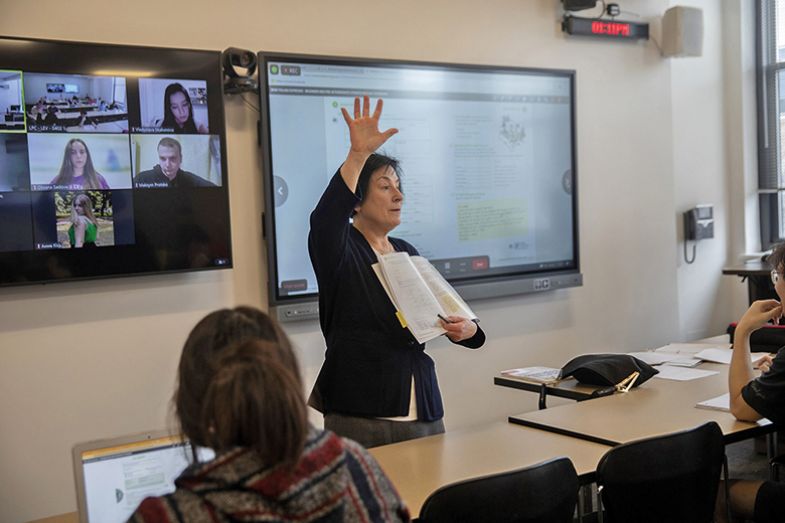
Since Russia’s invasion, academics have continued to work amid air-raid sirens and power cuts, teaching traumatised students while grappling with their own mental health. Yet while this “demonstration of strength, resilience and bravery” is admirable, “it’s worth understanding the cost of [the] internal resources [necessary] to cope with this new teaching reality,” Tsybuliak says. “Widespread burnout” among academic staff is likely to have a “profound” impact on Ukrainian higher education, she says, likening many academics’ psychological state to “a dead battery”, which could “manifest in a decline in teaching quality, a decrease in research output and innovation, and a potential exodus from the academic profession”.
The risk is not lost on university leaders. At KSE, for instance, psychological support is offered to both staff and students, and is always fully booked, says Stadnyi. “Anxiety and trauma are still here. We can’t cure them 100 per cent, but we can reduce the effects.”
Most of the students and staff of Mariupol State University were still in the city during the siege of Mariupol, believed to have killed at least 8,000. Many volunteered to fight to defend the city, resulting in 10 students losing their lives and nine being captured, according to the university (which still has 39 students currently serving in the armed forces). “Everyone has their own blockbuster movie of how they survived,” says rector Mykola Trofymenko. To date, 18 of the university’s students and employees are confirmed to have died, while a further 252 are still missing. “We understand that they are not alive,” Trofymenko says.
Early on 24 February 2022, the rector and his staff filled vehicles with everything they could save – servers, laptops, archival documents – and drove north-west to Ukrainian controlled Dnipro, where they dropped off their loads and returned to Mariupol.
“I came back to be with my staff, colleagues and students: it was a choice to be with my people,” Trofymenko says. “The only mistake I made was that I agreed to take my wife and son because my wife refused to stay [in Dnipro] without me.”
Trofymenko is gregarious and impassioned; he interrupts himself to apologise for talking too much, explaining, “I can talk a lot about my university.” When he speaks about the siege, however, his voice drops and the words come to him more slowly. “I’ve seen a lot,” he says. “I’ve seen a lot of people killed. I was taking my son to another place, hiding him, searching for food, trying to find food for the students in the dormitory, travelling through the city under the shelling. It’s difficult.”
After three weeks of terror, the rector and his family escaped the besieged city, which fell to Russia a couple of months later. “It was my son, my wife, my mother-in-law and my little dog. Without any stuff, in one car with broken windows.” He pauses, then repeats: “It’s difficult.”
From there, though, things began to look up. With its campus in ruins and its city under occupation, the university was gifted a disused building in Kyiv, formerly belonging to the Kyiv National University of Construction and Architecture. And although “it was in awful condition…without any reconstruction or renovations for at least 40 years”, it was transformed with funding from the European Commission, and now hosts 400 students, while another 2,800 join classes remotely. That total of 3,200 is still significantly fewer than the 4,800 who attended Mariupol State University before the war, but is quite an achievement for an institution that, in the immediate aftermath of the siege, was reduced to “me and my computer”, according to Trofymenko.
Through the twinning initiative established by Cormack Consultancy Group and Universities UK, Mariupol State University – whose logo is now a dove, following a design competition it launched in the wake of its evacuation – is also one of more than 100 Ukrainian institutions to twin with a university in the UK. Its partner, the University of Hull, has raised funds to refurbish student accommodation in Kyiv, supplied IT equipment and shared online library access. (Other UK-Ukraine partnerships have involved faculty exchanges, joint research partnerships and dual degrees.)
Ukraine’s Ministry of Education and Science has also provided Mariupol State University with a further four vacant buildings, which will eventually become the institution’s new campus. “Of course, they’re in awful condition, but they’re very promising. They can be made beautiful and comfortable,” says Trofymenko. “I think that we will succeed.”
Although there are success stories, however, Osipian fears that other displaced universities have relocated in name only. “They move to some other city where it’s relatively safe, and they register their legal address in that city, but there are no classrooms, no real administration, no students, no dorms, no research facilities,” he says.
Without sufficient crisis management, some institutions are simply “trying to make it look like they still function normally”, Osipian adds, enrolling and graduating students without the faculty or resources to hold classes. He is sceptical of universities that have switched entirely to online learning because “if it doesn’t take place in a [physical] classroom, it’s very hard to control the quality of teaching.”
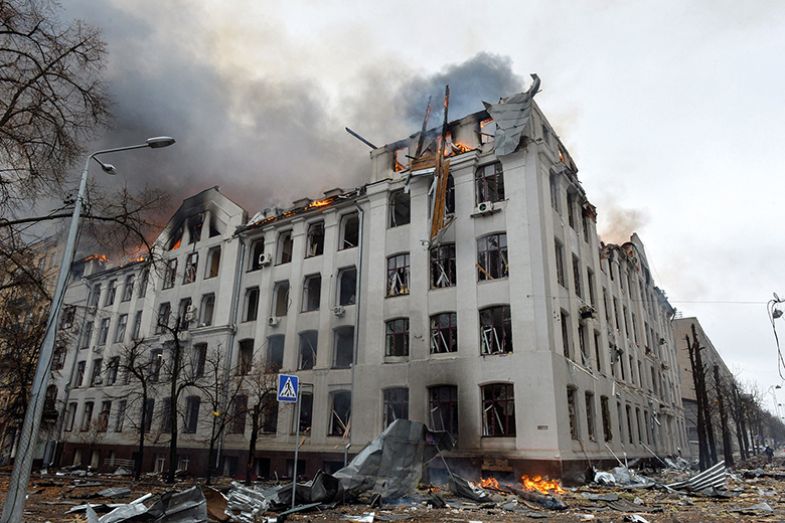
Still, he believes that it is possible to make progress on the rebuilding of Ukrainian higher education even as the war grinds on. “There are safe cities in western Ukraine, like Lviv and Chernivtsi,” he says. “International aid can be brought to those safe cities. But it would have to come with conditions attached.” Aid should be paired with technical expertise, he believes, to enable Ukraine’s higher education system to be streamlined and restructured.
Mergers are long overdue to cut down Ukraine’s bloated network of institutions, agrees KSE’s Stadnyi. And the tight control that the state has traditionally had over higher education institutions should be diluted so that those merged institutions can adapt to the varied learning losses of their students, many of whom saw their education compromised first by Covid, then by war.
“We need financial autonomy for public universities and more autonomy in terms of years of study, in terms of how many courses a student will take per year,” Stadnyi says. “We need to loosen control and give the authority to the universities to decide themselves what is better for students. Flexibility should be the new motto for Ukrainian higher education.”
Mariupol’s Trofymenko echoes Stadnyi’s call for mergers, while stressing the need also for a new generation of visionary leaders to steer the reorganised institutions. “We have this problem with rectors staying in their position for 30 years, 40 years,” he says. “It’s a problem because you have to change the vision. After seven years or 10 years, you don’t see the problems because you’re used to the environment.”
When it comes to higher education reform, he hopes that the war “will make us make these decisions faster” – particularly as Ukraine needs effectively educated people if it is to repel offensives conducted not only on land and air, but also in cyberspace. “This war is different from others,” he explains: “In different spheres, everywhere we are fighting.”
But the risk is that as war becomes normalised, the impetus for change may diminish. For instance, “We notice that people even in Ukraine are forgetting about Mariupol,” Trofymenko says. That is why he continues to make regular media appearances around the world to talk about his institution and how it came to be displaced: “The mission of the university is not to let people forget about it.”
Still, with no end to the fighting in sight, Trofymenko admits that he follows the news with trepidation, as legislatures in Europe and the US waver over rubberstamping further funding deals for Ukraine. “This is the challenge,” he acknowledges. “We understand that people are tired of the war.”
But if international support does wane, that might be seen as all the more reason for Ukraine to reassemble its top academics on its own soil, to lend their expertise to the war effort. That will become all the more urgent if the Ukrainian parliament passes new conscription legislation that, according to Kostyuk, may exempt only academics with research degrees (students 30 years and older who already have a degree may also be required to fight, Kostyuk says). However, he estimates that about 70 per cent of Ukrainian academics have such a qualification, and he doubts that any new law will affect expatriate Ukrainian academics’ decisions on whether or not to return: “Most of them will come if they have better labour terms in Ukraine than before the war,” he says.
How easy it will be to offer such terms amid the ongoing conflict is unclear, particularly as concerns mount about the solidity of US support for Ukraine’s ongoing defence. But, either way, the government is clearly keen for its academic diaspora to return as soon as possible.
“To rebuild, and to win this war, we need our minds at home,” education minister Wynnyckyj told the Going Global conference in December. “The message from our ministry is: ‘Dear Ukrainians, it’s time to come home.’”
Register to continue
Why register?
- Registration is free and only takes a moment
- Once registered, you can read 3 articles a month
- Sign up for our newsletter
Subscribe
Or subscribe for unlimited access to:
- Unlimited access to news, views, insights & reviews
- Digital editions
- Digital access to THE’s university and college rankings analysis
Already registered or a current subscriber?



